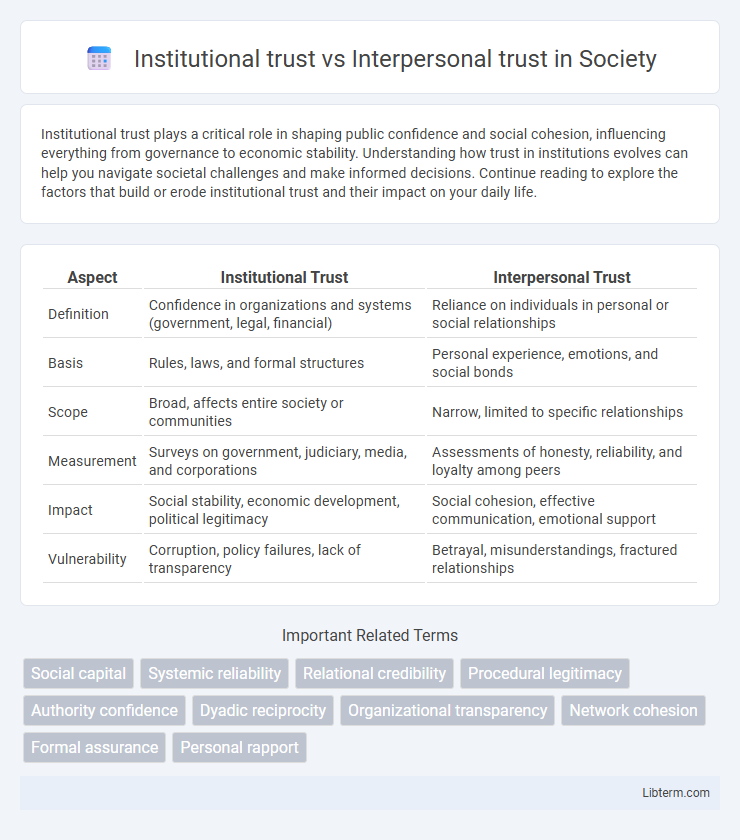Institutional trust plays a critical role in shaping public confidence and social cohesion, influencing everything from governance to economic stability. Understanding how trust in institutions evolves can help you navigate societal challenges and make informed decisions. Continue reading to explore the factors that build or erode institutional trust and their impact on your daily life.
Table of Comparison
| Aspect | Institutional Trust | Interpersonal Trust |
|---|---|---|
| Definition | Confidence in organizations and systems (government, legal, financial) | Reliance on individuals in personal or social relationships |
| Basis | Rules, laws, and formal structures | Personal experience, emotions, and social bonds |
| Scope | Broad, affects entire society or communities | Narrow, limited to specific relationships |
| Measurement | Surveys on government, judiciary, media, and corporations | Assessments of honesty, reliability, and loyalty among peers |
| Impact | Social stability, economic development, political legitimacy | Social cohesion, effective communication, emotional support |
| Vulnerability | Corruption, policy failures, lack of transparency | Betrayal, misunderstandings, fractured relationships |
Defining Institutional Trust
Institutional trust refers to the confidence individuals place in organizations, systems, or governing bodies to act reliably, fairly, and effectively according to established rules and norms. It is built on perceptions of transparency, accountability, and consistency within institutions such as governments, legal systems, corporations, and public services. Unlike interpersonal trust, which is based on direct personal relationships, institutional trust depends on the collective reputation and structural integrity of formal entities.
Understanding Interpersonal Trust
Interpersonal trust refers to the confidence individuals place in others based on personal experiences, emotional bonds, and direct interactions, often shaped by perceived reliability, honesty, and empathy. It develops through consistent, positive exchanges and plays a crucial role in forming and maintaining social relationships, influencing cooperation and communication. Unlike institutional trust, which depends on the legitimacy and performance of systems or organizations, interpersonal trust hinges on individual behaviors and mutual understanding within social networks.
Key Differences between Institutional and Interpersonal Trust
Institutional trust refers to the confidence individuals place in organizations, systems, or institutions, such as governments, corporations, or legal systems, whereas interpersonal trust is the faith one person has in another individual's reliability, integrity, or competence. Key differences include the scope, with institutional trust affecting large social structures and policies, while interpersonal trust governs personal relationships and social interactions. Furthermore, institutional trust is often built on perceived transparency, accountability, and fairness, whereas interpersonal trust depends on personal experience, emotional bonds, and consistent behavior over time.
Origins and Foundations of Trust
Institutional trust originates from belief in formal structures such as government, legal systems, or corporations, grounded in perceived legitimacy, transparency, and consistent rule enforcement. Interpersonal trust develops through direct social interactions, relying on personal experience, emotional bonds, and expectations of reliability and honesty in individual relationships. The foundations of trust intertwine cognitive evaluations of competence and integrity with affective components like empathy and shared values, shaping distinct yet interrelated trust dynamics in society.
Factors Influencing Institutional Trust
Factors influencing institutional trust include transparency, accountability, and consistent performance of the institution. Public perceptions of fairness, competence, and reliability play critical roles in shaping confidence in governmental bodies, financial institutions, and legal systems. Media representation and personal experiences also significantly impact the level of trust individuals place in institutions compared to interpersonal trust.
Factors Influencing Interpersonal Trust
Interpersonal trust is influenced by factors such as communication transparency, consistency in behavior, and perceived competence, which enable individuals to predict others' actions and intentions reliably. Emotional intelligence and shared values strengthen the bond by fostering empathy and mutual understanding, essential for trust development. Past experiences and reputation also play critical roles, as positive interactions build confidence in others' reliability and integrity over time.
The Role of Trust in Social Systems
Institutional trust refers to the confidence individuals place in organizations, governments, and formal systems to act reliably and fairly, while interpersonal trust involves the belief in the honesty and integrity of other individuals. Trust in social systems hinges on the balance between these two; high institutional trust promotes social cohesion and compliance with laws, whereas strong interpersonal trust fosters collaboration and social capital within communities. The interplay of institutional and interpersonal trust significantly impacts social stability, economic development, and the effective functioning of governance structures.
Consequences of Eroded Trust
Eroded institutional trust often leads to decreased civic engagement, lower tax compliance, and weakened support for public policies, undermining social stability and economic development. When interpersonal trust diminishes, it results in reduced cooperation, increased social conflict, and fragmented communities, impairing social cohesion and collective problem-solving. Both forms of trust erosion contribute to heightened uncertainty, reduced social capital, and compromised democratic governance.
Building and Restoring Trust at Both Levels
Building institutional trust requires transparent governance, consistent policy enforcement, and accountability mechanisms that demonstrate reliability to the public. Restoring institutional trust involves acknowledging past failures, implementing corrective reforms, and fostering open communication channels between institutions and communities. Interpersonal trust develops through consistent, honest interactions, empathy, and mutual respect, while restoration depends on sincere apologies, reparative actions, and rebuilding emotional bonds over time.
Future Trends in Trust Dynamics
Institutional trust is increasingly influenced by transparency technologies such as blockchain and AI-driven accountability systems, fostering greater public confidence in governance and financial institutions. Interpersonal trust is evolving alongside digital communication platforms, where social media algorithms and virtual interaction styles reshape trust-building among individuals. Future trends indicate a convergence where institutional systems leverage personal data ethics to maintain credibility, while interpersonal trust adapts to hybrid online-offline environments emphasizing authenticity and data privacy.
Institutional trust Infographic

 libterm.com
libterm.com